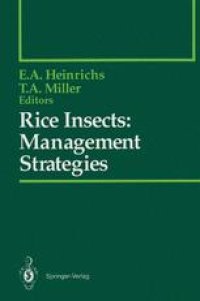
Ebook: Rice Insects: Management Strategies
- Tags: Ecology, Mathematical and Computational Biology, Statistics for Life Sciences Medicine Health Sciences, Agriculture, Forestry
- Series: Springer Series in Experimental Entomology
- Year: 1991
- Publisher: Springer-Verlag New York
- Edition: 1
- Language: English
- pdf
Due to the worldwide importance of rice as a crop plant, the biology of rice pests is of great interest to agricultural research. This timely book brings together contributions from the fields of entomology, agronomy, population ecology, and biostatistics to provide a comprehensive survey of rice-insect interaction. Among the topics discussed are - crop loss assessment - economic thresholds and injury levels for incest pests - mosquito leafhoppers and planthoppers population dynamics - pheromone utilization - techniques for predator evaluation - chemical based for insect resistance - applications of tissue culture - systems analysis and - rice pestmanagement. With its emphasis on experimental techniques of pest analysis and control, Rice Insects: Management Strategies will be a valuable reference for researchers and practitioners alike.
Due to the worldwide importance of rice as a crop plant, the biology of rice pests is of great interest to agricultural research. This timely book brings together contributions from the fields of entomology, agronomy, population ecology, and biostatistics to provide a comprehensive survey of rice-insect interaction. Among the topics discussed are - crop loss assessment - economic thresholds and injury levels for incest pests - mosquito leafhoppers and planthoppers population dynamics - pheromone utilization - techniques for predator evaluation - chemical based for insect resistance - applications of tissue culture - systems analysis and - rice pestmanagement. With its emphasis on experimental techniques of pest analysis and control, Rice Insects: Management Strategies will be a valuable reference for researchers and practitioners alike.
Due to the worldwide importance of rice as a crop plant, the biology of rice pests is of great interest to agricultural research. This timely book brings together contributions from the fields of entomology, agronomy, population ecology, and biostatistics to provide a comprehensive survey of rice-insect interaction. Among the topics discussed are - crop loss assessment - economic thresholds and injury levels for incest pests - mosquito leafhoppers and planthoppers population dynamics - pheromone utilization - techniques for predator evaluation - chemical based for insect resistance - applications of tissue culture - systems analysis and - rice pestmanagement. With its emphasis on experimental techniques of pest analysis and control, Rice Insects: Management Strategies will be a valuable reference for researchers and practitioners alike.
Content:
Front Matter....Pages i-xiii
Crop Loss Assessment in Rice....Pages 1-65
Economic Thresholds and Injury Levels for Insect Pests of Rice....Pages 67-105
Determination of Riceland Mosquito Population Dynamics....Pages 107-139
Rice Insect Pheromone Identification and Utilization in Monitoring....Pages 141-166
Long-Distance Migration of Rice Insects....Pages 167-195
Techniques for Evaluating Predators and Parasitoids in Rice....Pages 197-214
Methods to Evaluate the Variability of Rice Leafhopper and Planthopper Populations....Pages 215-233
Techniques and Methods to Evaluate the Chemical Bases of Insect Resistance in the Rice Plant....Pages 235-274
Application of Tissue Culture Techniques to the Development of Insect-Resistant Rice....Pages 275-285
Systems Analysis and Rice Pest Management....Pages 287-321
Back Matter....Pages 323-347
Due to the worldwide importance of rice as a crop plant, the biology of rice pests is of great interest to agricultural research. This timely book brings together contributions from the fields of entomology, agronomy, population ecology, and biostatistics to provide a comprehensive survey of rice-insect interaction. Among the topics discussed are - crop loss assessment - economic thresholds and injury levels for incest pests - mosquito leafhoppers and planthoppers population dynamics - pheromone utilization - techniques for predator evaluation - chemical based for insect resistance - applications of tissue culture - systems analysis and - rice pestmanagement. With its emphasis on experimental techniques of pest analysis and control, Rice Insects: Management Strategies will be a valuable reference for researchers and practitioners alike.
Content:
Front Matter....Pages i-xiii
Crop Loss Assessment in Rice....Pages 1-65
Economic Thresholds and Injury Levels for Insect Pests of Rice....Pages 67-105
Determination of Riceland Mosquito Population Dynamics....Pages 107-139
Rice Insect Pheromone Identification and Utilization in Monitoring....Pages 141-166
Long-Distance Migration of Rice Insects....Pages 167-195
Techniques for Evaluating Predators and Parasitoids in Rice....Pages 197-214
Methods to Evaluate the Variability of Rice Leafhopper and Planthopper Populations....Pages 215-233
Techniques and Methods to Evaluate the Chemical Bases of Insect Resistance in the Rice Plant....Pages 235-274
Application of Tissue Culture Techniques to the Development of Insect-Resistant Rice....Pages 275-285
Systems Analysis and Rice Pest Management....Pages 287-321
Back Matter....Pages 323-347
....